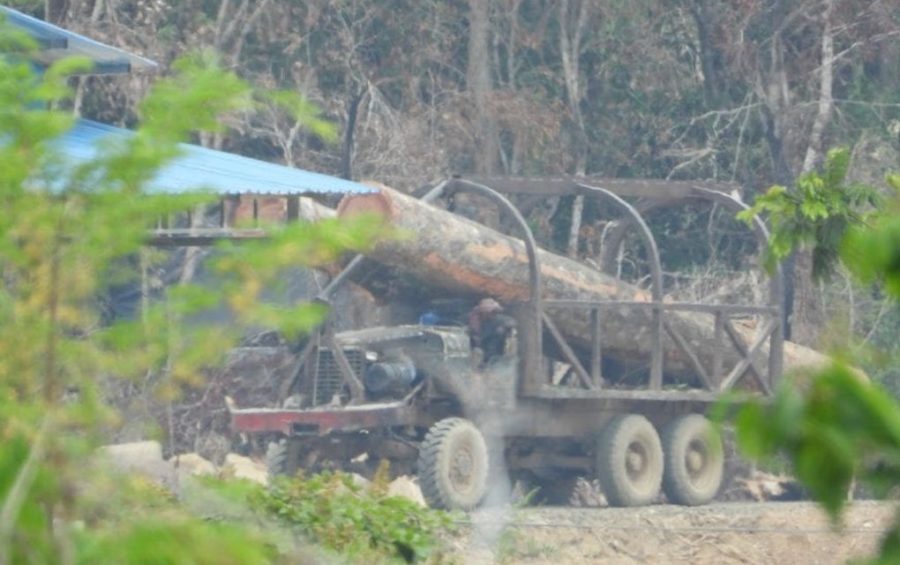Three business tycoons who were summoned for court questioning in relation to alleged forestry crimes are suspected by officials of attempting to avoid justice, days after the government issued a plan directing authorities to freeze the assets of forestry offenders and take other actions.
A summons from the Mondulkiri Provincial Court orders oknhas Von Bunthai; Srun Mengleang, owner of Srun Mengleang company; and Top Virda, owner of Vichery company; to appear in court for questioning before Saturday (August 31) over accusations related to illegally collecting and transporting forestry products.
The summons, issued by prosecutor Heang Sopheak on July 29, does not state Bunthai’s company.
“They all escaped,” Sopheak said on Tuesday, adding that he did not know the men’s whereabouts and that national authorities were aware of the case.
Local authorities told the court they inspected the men’s residences or companies, and found no one at home, court spokesman Mam Vanda told VOD.
The summons lists addresses for Mengleang and Bunthai in Tbong Khmum province. Virda’s company has an address in Kratie.
Tbong Khmum provincial police chief Pen Rath said authorities would assist in bringing in the three tycoons if there was an order from the court.
“We will wait and see if the court takes the second step. Now, it is a summons. The court called them in for questioning and if they do not show up, the court could issue a warrant to arrest them,” Rath said.
Pen Bonnar, a community empowerment officer at rights groups Adhoc, said court summonses give suspects plenty of time to escape justice.
“It seems careless because we have to think this is a serious crime and if they have time to escape, those involved in forestry crimes will probably escape,” Bonnar said.
On August 15, authorities arrested oknha Kong Kroeng and another man, Mat Naseat, after the two were summoned for questioning to the Kratie provincial military police headquarters over alleged forestry crimes, according to Radio Free Asia.
During a meeting of the CPP’s central committee on Thursday, Prime Minister Hun Sen advised the Anti-Corruption Unit to freeze the assets of those who had destroyed natural resources.
On the following day, the Council of Ministers announced a plan aiming to tackle forestry crimes by canceling all timber transport permits, and freezing assets and posting the names of offenders near sawn timber, an official letter said.
In a letter dated August 23, Hing Thoraxy, a secretary of state at the Council of Ministers, with approval from Prime Minister Hun Sen, ordered the Agriculture Ministry and the National Anti-Deforestation Committee to revoke all previously issued transport permits for forestry products from land concessions, and to prepare for the issuance of new permits.
In order to more easily control the transportation of forestry goods, including timber and non-timber products, the government said it would also withdraw licenses from companies that did not comply with the law.
In the same letter, the Council of Ministers ordered authorities to take action by freezing the assets of people connected to forestry crimes, and inscribing their names near the sites of confiscated timber and trucks. Timber traffickers would also still face prison sentences and fines.
The government’s strategy was intended to “raise awareness, educate and show the government’s attention in protecting the forest as well as preventing forestry crimes,” according to the letter.
National Military Police spokesman Eng Hy said the anti-deforestation committee’s forces would cooperate with relevant authorities to inspect forest concessions and transported timber, but arrests would be up to the Forestry Administration and Environment Ministry.
“We continue with our activities,” Hy said.
However, Agriculture Minister Veng Sakhon told VOD in a message that the ministry had not yet made any decisions regarding actions to be taken following the Council of Ministers’ order.
“We are working on this very carefully,” Sakhon said.
Sim Bunthoeun, country program manager of the Non-Timber Forest Products Exchange Programme, said harvesting non-timber products, such as fruits, nuts, medicinal plants, resins, rattan and other goods from the forest did not harm the environment.
While the new order appeared to refer to all forestry products, he said he had not received any notice from the Agriculture Ministry regarding the canceling of transport permits for non-timber products.
“Because the cancellation covers all forestry products, so besides timber, I think I can reapply because we, the indigenous community, need to be free to run small businesses in which we use non-timber products,” Buntheoun said.
The exchange program in Cambodia supports indigenous groups who engage in local forestry businesses.
Environmental activist San Mala, who campaigns against illegal logging in Preah Vihear province, said the government’s plan showed that concerns raised by civil society and environmental activists over land grabbing under the pretext of clearing land concessions were a reality, while the government continues to mismanage forests.
“I think we should not have permits revoked without investigating whether the past licenses were irregular and there was collusion in the issuance of all these permits, and whether there was collusion in illegally exporting timber,” Mala said.
He doubted that the government’s latest efforts against deforestation would be fruitful, and suggested officials should accept evidence of forestry crimes discovered by advocates and respond more effectively, rather than dismiss allegations.
(Translated and edited from the original articles on VOD Khmer)













